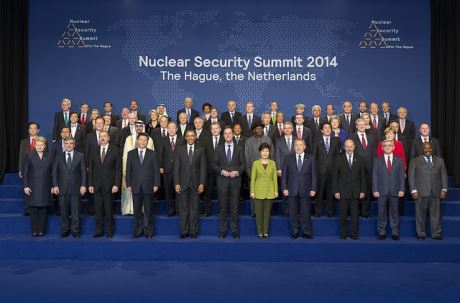Thirty-five states have pledged to strengthen nuclear security measures through self-assessments and periodic external reviews..
 |
| World leaders convene at the 2014 Nuclear Security Summit (Image: NSS 2014) |
Almost two-thirds of the states represented at the third Nuclear Security Summit (NSS) in the Netherlands have committed themselves to measures aimed at establishing an "effective and sustainable" nuclear safety regime.
Nuclear security accreditation
The World Institute for Nuclear Security (WINS) Academy has launched a first-of-a-kind certification program for nuclear security professionals. The scheme is the first accredited program for nuclear security professionals.
Candidates will be able to sit the computer-based exams, which are offered in partnership with Pearson VUE, at over 5100 test centres in 175 countries.
The measures, set out in a joint statement, include commitments to improve security regimes through conducting self-assessments, hosting periodic reviews by international experts, such as the International Physical Protection Advisory Service, and acting upon the recommendations from such reviews. Subscribing states will also contribute to the improvement of the nuclear security regime through actions ranging from information exchange to financial support.
Nuclear security remains a national responsibility, with individual states expected to establish their own legal frameworks, governance structures and measures. More than 120 nations have already pledged to follow International Atomic Energy Agency (IAEA) nuclear security guidelines, although these are not mandatory. The joint declaration contains a commitment to embed these IAEA recommendations into national rules and regulations, thereby making them legally binding at the national level.
Algeria, Armenia, Australia, Belgium, Canada, Chile, Czech Republic, Denmark, Finland, France, Georgia, Germany, Hungary, Israel, Italy, Japan, Kazakhstan, Lithuania, Mexico, Morocco, the Netherlands, New Zealand, Norway, the Philippines, Poland, Romania, South Korea, Spain, Sweden, Turkey, Ukraine, the United Arab Emirates, the UK, the USA and Vietnam have signed up to the pledges in the joint statement.
Industry concurs
The incorporation of national and international guidance and best practice in the implementation of nuclear security measures was the foremost in a list of recommendations made by the nuclear industry in a joint statement from its own two-day summit, held in Amsterdam in conjunction with the NSS and attended by some 200 leaders from the worldwide nuclear industry.
The joint statement recognised the industry's ongoing active role in working to improve all aspects of nuclear security, including physical protection, material accountancy and security culture, as well as working to convert research reactors to use low-enriched instead of high-enriched uranium fuel where technically and economically feasible, and to expand the use of low-enriched uranium targets for radioisotope production, whilst ensuring continuous and stable supply of the vital medical isotope molybdenum-99.
Researched and written
by World Nuclear News






_15863.jpg)







